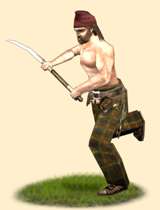Drapanai (Dacian Falxmen)
 |
Weapons | Defence | Mental | ||||||
|---|---|---|---|---|---|---|---|---|---|
| Primary | Secondary | Armour: | 1 | Morale: | 15 | ||||
| Type: | sword | none | Shield: | 0 | Discipline: | impetuous | |||
| Attack: | 9 | 0 | Skill: | 12 | Training: | untrained | |||
| Charge: | 10 | 0 | Recruitment | Other | |||||
| Lethality: | 0.26 | 0.1 | Soldiers: | 40 | Hit Points: | 1 | |||
| Range: | 0 | 0 | Cost: | 872 | Mass: | 1.18 | |||
| Ammo: | 0 | 0 | Upkeep: | 218 | |||||
| Turns: | 1 | ||||||||

The Drapanai contingents comprise resolute warriors, well aware of their role on the battlefield as shock troops.
Impetuous
Expert at Hiding in Forests
The Drapanai contingents are made up of resolute warriors, well aware of their role on the battlefield as shock troops. While the average Getic soldier tells himself he is immortal, the Drapanai, more than any others, join battle without fear of death. They fight bare-chested and with only baggy trousers, not for protection but to keep some warmth. Their trademark though is the falx, a vicious blade capable of severing limbs and causing horrible wounds with a single, crushing blow. These warriors are best used as shock troops against enemy infantry. If used properly, they can cut their way through and open a gap in the enemy battle line, allowing other Getic warriors to exploit the opening. Their lack of armour might be a drawback against concentrated enemy missile fire and they should thus not be exposed to enemy ranged infantry needlessly.
Historically, a Drapanai soldier is the archetype of the Getic warrior, bare-chested and armed with the falx. The falx weapon was developed from the Thracian rhomphaia and it became a traditional weapon among the Getai. The ones wielding it and who often made up the Drapanai were young vigorous warriors, striving to achieve recognition among their kin and fellow men. The religious aspects should not be overlooked either, as these men formed the frontline and served as shock troops which meant they were more exposed to the enemy, where the Getic religious zeal was of immense importance as these warriors did not fear death, because death was the gateway to their prophet-god Zalmoxis. Their valor is best shown during the Second Dacian War, when the Roman soldiers were issued new types of armor, greaves, modified helmets and especially stronger armguards to protect themselves against the falx, and Roman troops stationed in Dacia, as the Romans called Getia, in the later first century AD were still issued these armguards and armor pieces so not to lose their limbs!